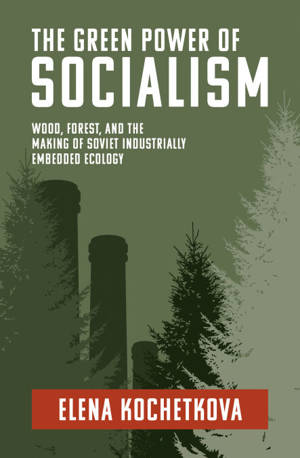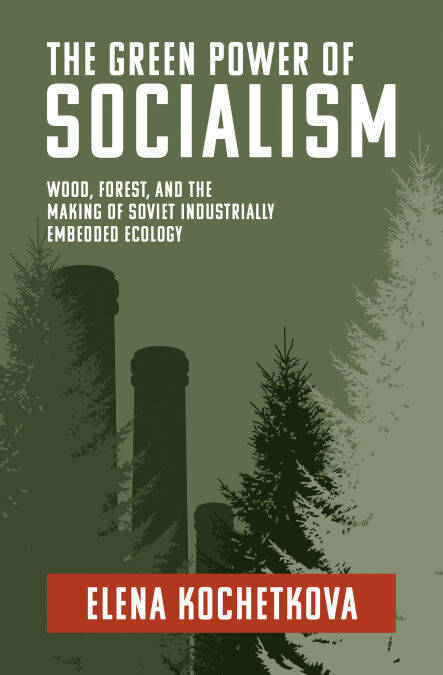
Bedankt voor het vertrouwen het afgelopen jaar! Om jou te bedanken bieden we GRATIS verzending (in België) aan op alles gedurende de hele maand januari.
- Afhalen na 1 uur in een winkel met voorraad
- In januari gratis thuislevering in België
- Ruim aanbod met 7 miljoen producten
Bedankt voor het vertrouwen het afgelopen jaar! Om jou te bedanken bieden we GRATIS verzending (in België) aan op alles gedurende de hele maand januari.
- Afhalen na 1 uur in een winkel met voorraad
- In januari gratis thuislevering in België
- Ruim aanbod met 7 miljoen producten
Zoeken
The Green Power of Socialism E-BOOK
Wood, Forest, and the Making of Soviet Industrially Embedded Ecology
Elena Kochetkova
€ 39,42
+ 39 punten
Omschrijving
How the Soviet forestry industry developed a unique form of industrial ecology—a commonsense approach toward natural resources for the economy and society.
In The Green Power of Socialism, Elena Kochetkova examines the relationship between nature and humans under state socialism by looking at the industrial role of Soviet forests. The book explores evolving Soviet policies of wood consumption, discussing how professionals working in the forestry industry of the Soviet state viewed the present and future of forests by considering them both a natural resource and a trove of industrial material. When faced with the prospect of wood shortages, these specialists came to develop new industry-ecology paradigms. Kochetkova looks at the materiality of Soviet industry through forests and wood to show how, paradoxically, industrial ecology emerged and developed as a by-product of the Soviet industrialization project.
The Green Power of Socialism also discusses how post-Soviet industry has abandoned these socialist practices and the idea of nature as a complicated ecosystem that provides a crucial service to society. Emphasizing the technological and environmental impacts of the Cold War, Kochetkova critically reconsiders two explanatory models that have become dominant in the historiography of Soviet approaches to nature over the last decades—ecocide and environmentalism. Within the context of the current environmental crisis, the book invites readers to reevaluate state socialism as a complex phenomenon with sophisticated interactions between nature and industry. In so doing, it contributes a fresh perspective on the activities of socialist experts and their view of nature, shedding light on Soviet state industrial and environmental policy and its continuing legacy in the present day.
In The Green Power of Socialism, Elena Kochetkova examines the relationship between nature and humans under state socialism by looking at the industrial role of Soviet forests. The book explores evolving Soviet policies of wood consumption, discussing how professionals working in the forestry industry of the Soviet state viewed the present and future of forests by considering them both a natural resource and a trove of industrial material. When faced with the prospect of wood shortages, these specialists came to develop new industry-ecology paradigms. Kochetkova looks at the materiality of Soviet industry through forests and wood to show how, paradoxically, industrial ecology emerged and developed as a by-product of the Soviet industrialization project.
The Green Power of Socialism also discusses how post-Soviet industry has abandoned these socialist practices and the idea of nature as a complicated ecosystem that provides a crucial service to society. Emphasizing the technological and environmental impacts of the Cold War, Kochetkova critically reconsiders two explanatory models that have become dominant in the historiography of Soviet approaches to nature over the last decades—ecocide and environmentalism. Within the context of the current environmental crisis, the book invites readers to reevaluate state socialism as a complex phenomenon with sophisticated interactions between nature and industry. In so doing, it contributes a fresh perspective on the activities of socialist experts and their view of nature, shedding light on Soviet state industrial and environmental policy and its continuing legacy in the present day.
Specificaties
Betrokkenen
- Auteur(s):
- Uitgeverij:
Inhoud
- Aantal bladzijden:
- 258
- Taal:
- Engels
- Reeks:
Eigenschappen
- Productcode (EAN):
- 9780262377577
- Verschijningsdatum:
- 19/02/2024
- Uitvoering:
- E-book
- Beveiligd met:
- Adobe DRM
- Formaat:
- ePub

Alleen bij Standaard Boekhandel
+ 39 punten op je klantenkaart van Standaard Boekhandel
Beoordelingen
We publiceren alleen reviews die voldoen aan de voorwaarden voor reviews. Bekijk onze voorwaarden voor reviews.









